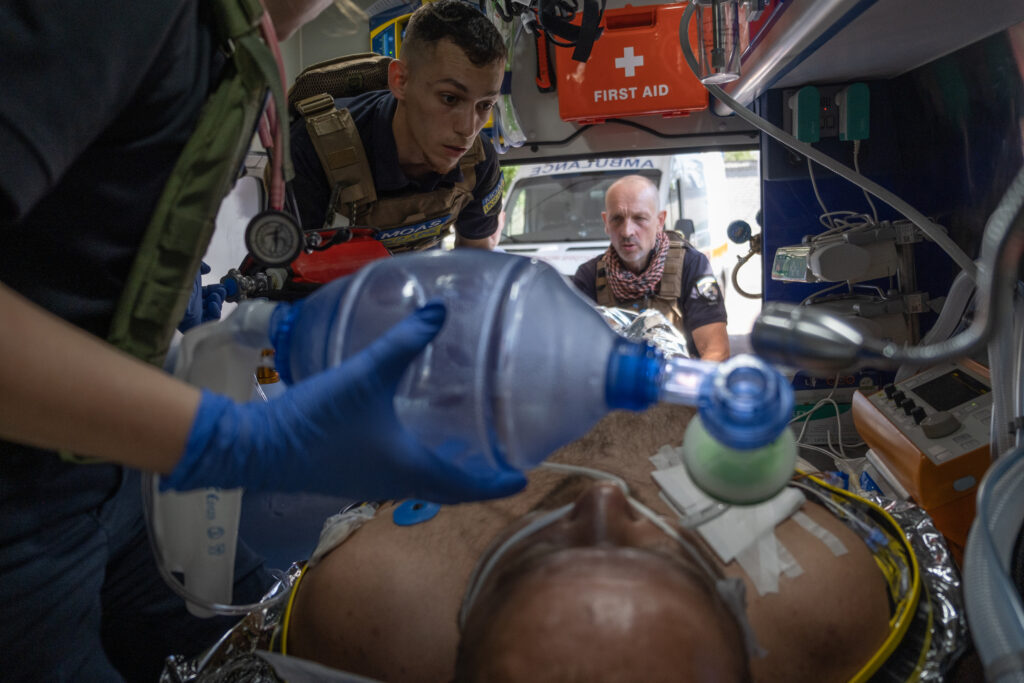On Ukraine’s medical front, fortune favors the bold
Lithuanian Foreign Minister Gabrielus Landsbergis didn’t pull his punches earlier in November when, pouring scorn on talk of a peace agreement with Russia, he noted that the West is flirting with catastrophe by missing the opportunity to “end centuries of the Kremlin’s imperial aggression.” If we fail, he continued, the consequences will be dire: “Our children will curse us in the trenches we are digging for them.”
As the leading external provider of emergency medical evacuation services to the Ukrainian army, we at MOAS are already keeping alive this generation’s children: the brave men and women fighting in those trenches. MOAS has saved 35,000 lives and counting in Ukraine. We run an emergency response operation right along the medical front line with our all-Ukrainian, 150-person-strong team of doctors, nurses, paramedics, and drivers, as well as 50 ambulances.

Every day, our medics treat and keep alive soldiers suffering from critical trauma injuries caused by shrapnel, mines, artillery fire, small arms, rockets – the list goes on. We see terrible head injuries, abdominal injuries, and far too many amputations. We carry soldiers thousands of miles to the hospital week in and week out.
The most amazing tribute to their skills is the fact that we haven’t lost a single patient under our care. When you consider the tens of thousands of soldiers we have cared for, and that we’ve been working in Ukraine since the war began, that’s an extraordinary record.
We are not a political organization, but we contend with the failures of our political leaders to bring this conflict to an end. Our business is at the sharp end, where we are often the difference between life and death. Every day, we see the real-life consequences of Russian aggression, and, every day, we save Ukrainian lives.
So much of what I know about Ukraine I’ve learned from our medics. They come from all over Ukraine, from Kyiv to Khmelnytskyi, from Dnipro to Lutsk, from Mykolaiv to Rivne.
I spoke the other day with Nataliia, one of our nurses based in eastern Ukraine. She told me it’s time to put an end to the historical notion that portrays Ukrainians and Russians as brothers. This war has shown Russia’s true face: “There is no going back,” she told me. “We are going to defend ourselves. This is our land, and we are going to fight for it.
I recall another conversation with Vita, a paramedic: “We aren’t just fighting for Ukraine and Ukrainians,” she said to me. “We need urgent assistance so that blood won’t be spilled in any other democratic countries. Our heroes are holding our borders and keeping us safe so we can be independent, free, and democratic.”
I’ve regularly seen our crews come back from an eight-hour round trip on a high-speed emergency evacuation and turn right back to do another one in the middle of the night. Their dedication to saving lives is completely humbling, and there is no let-up. It’s an operation that runs 24/7. Our crews are covering millions of miles across the front line.
It’s not just our medics who give me faith in Ukraine. The terribly wounded soldiers who we carry in our ambulances day in and day out to safety at more equipped regional hospitals are also an inspiration.
One of our doctors, Yurii, recently told me about a soldier in the back of his ambulance who had just had his leg blown off by a Russian mine. Even in this life-and-death moment, the soldier had no doubt about his mission: “Just give me a new leg, and I’m going straight back to fight the Russians!” he said. And he wasn’t joking.
There was another soldier who had just lost his leg, calling his wife on one of our medics’ phones in the back of the ambulance. His wife was in tears telling him how much she loved him and that he was going to be all right. The soldier was in tears as he spoke to her, and our medics were all in tears as they supported him. Stories like this stay with you. They remind us why we’re here, and provide the best evidence of the mighty Ukrainian spirit that carries this resistance.
While essential to winning the war, spirit alone is not enough. This is why Ukrainian President Volodymyr Zelensky, when asked by senators in Washington in September what would happen if the U.S. did not provide Kyiv with support, said the following: “What happens is we will lose.”
This is equally why the commander-in-chief of Ukraine’s Armed Forces, Valerii Zaluzhnyi, voiced the uncomfortable truth that the West is giving Ukraine what it needs to endure the war, but not what it needs to win.
As Ukraine heads into another winter of war and attrition, we have already saved tens of thousands of lives. We don’t want to have to save another. We don’t want to be here a day longer than we are needed, but we will stay here for as long as it takes. How long depends on Ukraine’s supporters – the U.S. foremost among them.
The Israel-Hamas War must not distract us from this monumental conflict between Russia and Western democracies, the result of which will help define the future of the free world. The U.S. needs to take the lead, up the ante decisively, and help Ukraine win this fight.
As Turnus said in Virgil’s “Aeneid” 2,000 years ago, “Audentis Fortuna Iuvat” – fortune favors the bold. Virgil didn’t write that fortune favors those who dither and delay or those who complain of war fatigue, fail to do what it takes, and start discussing ignominious peace deals. Continue on this path, and we face the disaster, as Landsbergis warned, of consigning our children to the trenches.
As Oleksii, one of our doctors, said to me the other day: “Losing is not an option. Now that you are in it, it is time to win it.”


